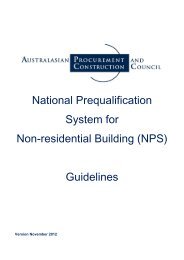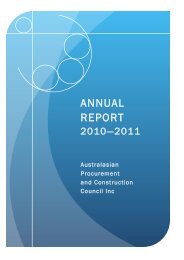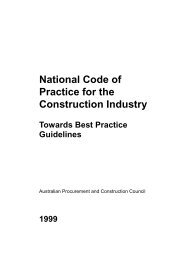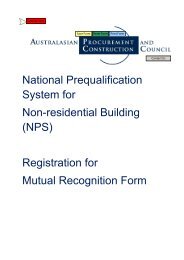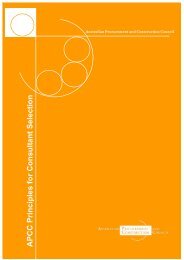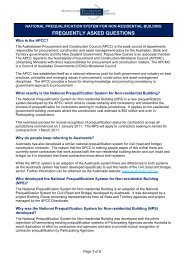Improving Security of Payment Building and Construction Industry
Improving Security of Payment Building and Construction Industry
Improving Security of Payment Building and Construction Industry
- No tags were found...
You also want an ePaper? Increase the reach of your titles
YUMPU automatically turns print PDFs into web optimized ePapers that Google loves.
5. Pro<strong>of</strong> <strong>of</strong> <strong>Payment</strong> Page 62National Public Works Council Inc<strong>Improving</strong> <strong>Security</strong> <strong>of</strong> <strong>Payment</strong> in the <strong>Building</strong> <strong>and</strong> <strong>Construction</strong> <strong>Industry</strong>most desirable dispute resolving mechanism as it will entail little expense <strong>and</strong> willresolve the dispute generally in a very short time period. Parties involved in the<strong>Building</strong> <strong>and</strong> <strong>Construction</strong> <strong>Industry</strong> should be encouraged to resort to directnegotiation before any other form <strong>of</strong> alternative dispute resolution is entertained.5.5.2 MediationThis is an informal mechanism used to resolve disputes in which an independentmediator brings an impartial perspective to the dispute <strong>and</strong> encourages the parties tonegotiate to resolve their dispute. A mediator does not have authority to make adecision for the parties. However, a mediator would encourage discussion betweenthe parties, perhaps highlighting those important issues which need discussing.The former Chief Justice <strong>of</strong> the Supreme Court <strong>of</strong> New South Wales, Sir LaurenceStreet, identified three elements in mediation as follows:5.5.3 Conciliation"The first is that the parties call in the aid <strong>of</strong> an impartial third-party tostructure a process for them within which they can negotiate aresolution <strong>of</strong> their dispute in the course <strong>of</strong> which they will meet <strong>and</strong>talk together with the mediator <strong>and</strong> the mediator will talk privatelywith each party in the course <strong>of</strong> the discussions.The second... is that the third-party has no power at all under the....mediation agreement to impose any decision or to h<strong>and</strong> down adetermination. The third-party is there simply to facilitate the flow <strong>of</strong>communication <strong>and</strong> to develop mutual underst<strong>and</strong>ing <strong>and</strong> help theparties towards a consensus.The third... is that the process is consensual throughout. It isconsensual from the beginning... consensual in that it continues as longas the parties want to go on negotiating... consensual in its culminationin that a successful mediation results in a contract... which is just asenforceable as any other contract".Conciliation is a process similar to mediation in which a conciliator, who may notnecessarily be a neutral person, will cause the parties to discuss their dispute <strong>and</strong>make submissions to each other on their points <strong>of</strong> view, with the objective that theparties resolve their dispute by agreement. A conciliator may indicate to the partiesthe strengths <strong>and</strong> weaknesses <strong>of</strong> each other's case <strong>and</strong> may propose various optionsfor settlement. As is the case with a mediator, a conciliator does not have the powerto make decisions on behalf <strong>of</strong> the parties.5.5.4 ArbitrationAn arbitrator is an independent third-party empowered with the ability to makedecisions for the parties <strong>and</strong> resolve the dispute for the parties by ultimately making


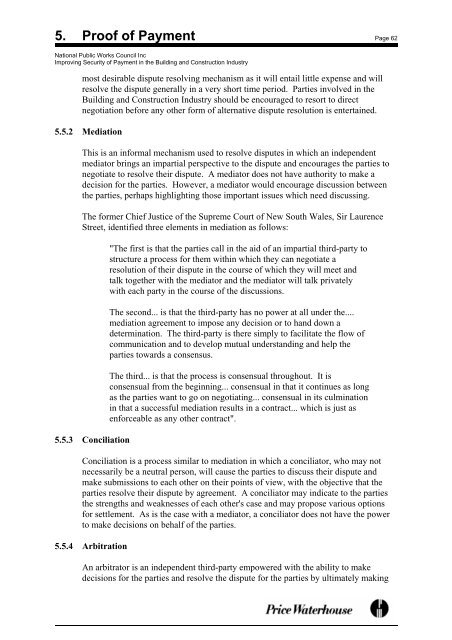
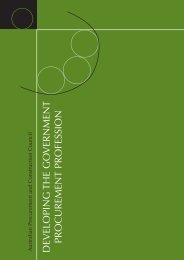
![NATIONAL COST ADJUSTMENT PROVISION EDITION 2 [NCAP2]](https://img.yumpu.com/48266135/1/184x260/national-cost-adjustment-provision-edition-2-ncap2.jpg?quality=85)


